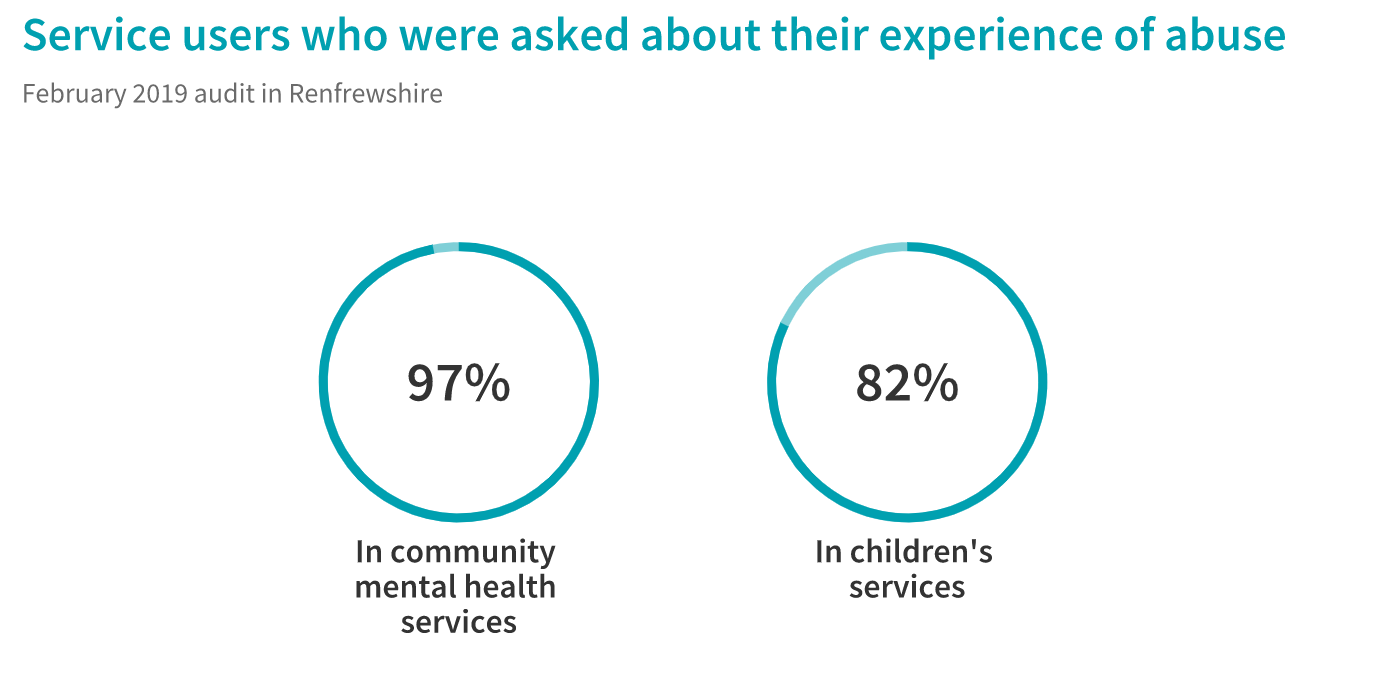Routine enquiry of domestic abuse training
The following case study looks at action taken by Renfrewshire Health and Social Care Partnership (HSCP) to train their workforce on the routine enquiry of domestic abuse.
Reason action was taken
As noted in our take the right actions page, one of the key ways to reduce health inequalities is by training the workforce to understand their role in this.
Approximately one in four women will experience domestic abuse across their lifetime. The physical, mental and sexual health consequences are considerable and well documented.
Pregnancy is a time when domestic abuse can begin or escalate, sometimes resulting in
- miscarriage
- low birth weight
- obstetric difficulties.
New ways of working to be trained on
Early identification and intervention is crucial to support women experiencing abuse. Therefore, in line with the Chief Executive Letter 41 and Equally Safe, routine enquiry (asking all women presenting to a service if they have experienced domestic abuse) was implemented within Renfrewshire’s HSCP community mental health services and children’s services.
They also introduced the use of the SafeLives Risk Identification Checklist (RIC) following disclosure of abuse. This is a validated, structured questionnaire designed to identify victims at high risk of significant harm or homicide. Victims that meet this threshold of harm are referred to the local Multi Agency Risk Assessment Conference (MARAC) which puts in place strategies to protect them and their children.
Action taken
Renfrewshire HSCP coordinated and delivered training to
- 97 staff from mental health services
- 88 staff from children’s services.
The training supported staff to understand the prevalence and dynamics of domestic abuse. It also supported them to understand their role in supporting those affected by it through facilitating disclosures, assessing risk and safety planning.
Initial challenges in implementing the process included staff difficulty in including routine enquiry into their already full assessment process. Some staff felt that domestic abuse was a private issue and it was not their place to ask women about this.
This was overcome by demonstrating to staff the scale of the issue and
- its impact upon the health of women and children
- how identification can support care planning
- the impact their intervention can have on the safety of the woman.
On occasion, routine enquiry would fall off the agenda for services resulting in fewer women being asked about gender based violence (GBV).
This was overcome by
- carrying out planned caseload audits and reporting the figures back to senior management
- offering refresher training to staff groups who were possibly lacking in confidence around routine enquiry and supporting women who disclose
- establishing focus groups for the staff groups demonstrating the lowest audit results, to help better understand how they could be supported.
People who helped
There was buy-in from senior management within both children’s services and mental health services. This allowed for a member of staff from the services to co-deliver the training and make sure questions could be answered in relation to the impact on service delivery. It also allowed for an audit process to be introduced to both services to monitor implementation.
There was also full support from Renfrewshire Council’s MARAC strategic lead in delivering the training.
Impact and lessons learned
By implementing routine enquiry into these priority settings and overcoming the challenges in doing so, there was a significant increase in the number of women routinely being asked about domestic abuse.
An audit in February 2019 showed that 97% and 82% of service users in community mental health and children’s services were asked about their experience of abuse.

Upon reflection it was noted by the HSCP that they would intervene earlier in future with regard to addressing any reduction in routine enquiry implementation. They would also ensure extra support or focus groups were delivered at the earliest opportunity to maintain momentum.
Further information
You can find out more about ways to reduce health inequalities within our reducing health inequalities section.
Find out more about routine enquiry and domestic abuse in our GBV section.
This case study is based on information provided by Ian Travers from Renfrewshire HSCP. If you would like to discuss further, you can contact our Health Promoting Health Service (HPHS) team by email at nhs.HealthScotland-hphsadmin@nhs.net.
